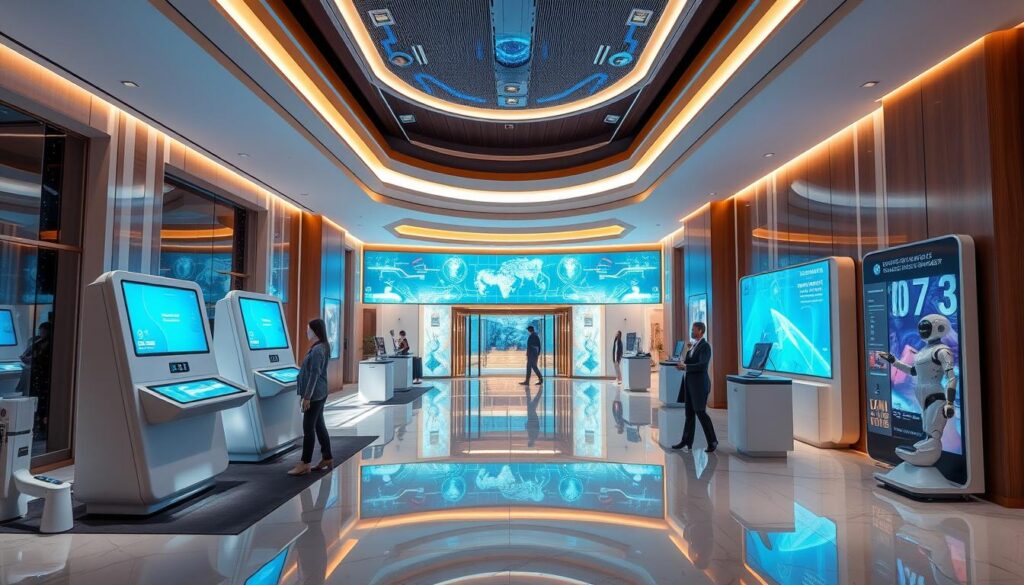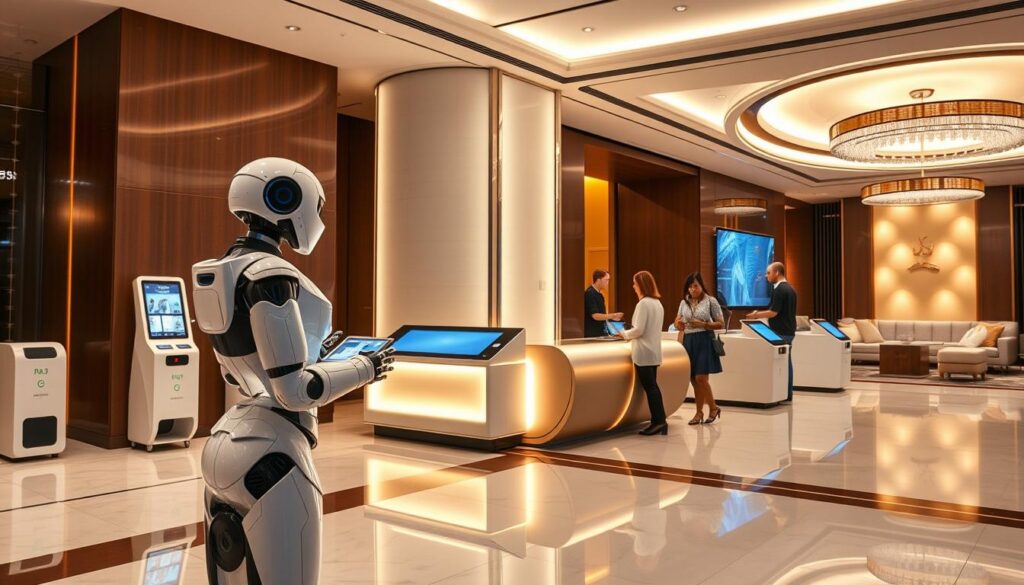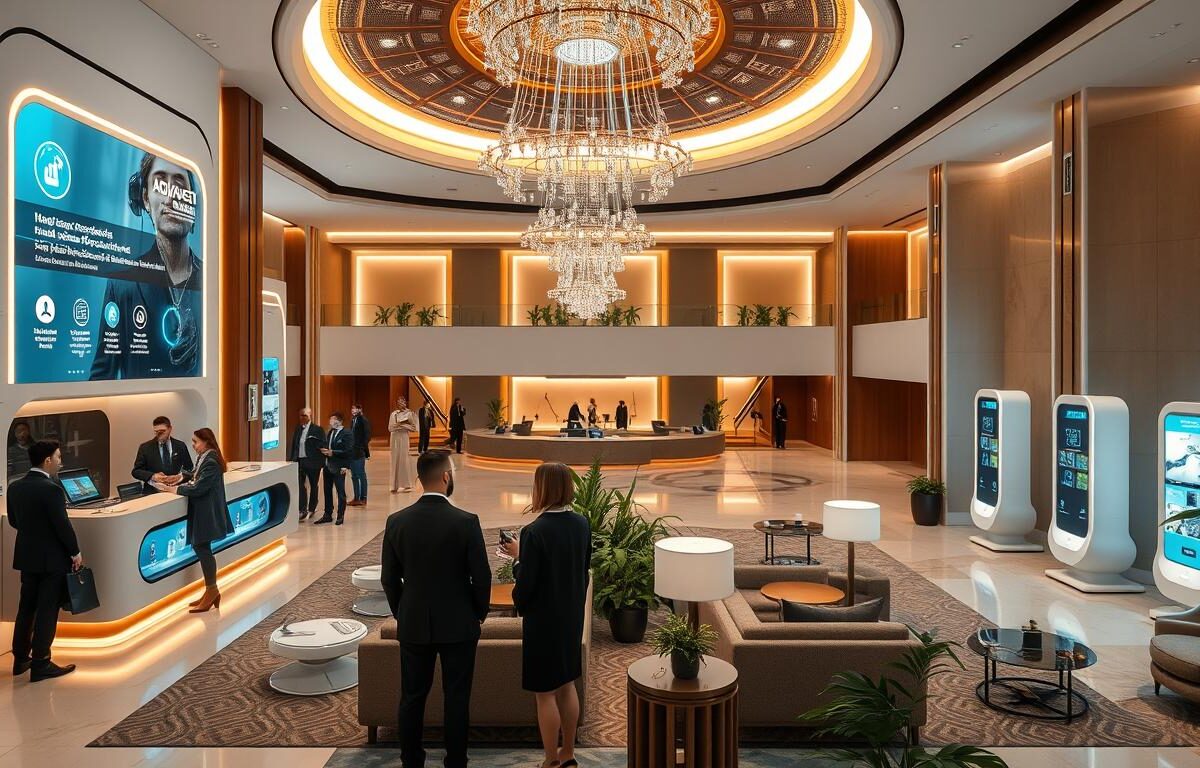The hospitality industry is changing fast with artificial intelligence (AI). It’s making guest experiences better and operations smoother. An AI agent for the hospitality sector acts like a digital helper. It does many things, from booking rooms to talking to guests in a personal way.
Hotels and resorts use AI to offer better service that goes beyond what guests expect. AI takes care of routine tasks like FAQs and bookings. This lets the staff give guests more personal attention. An impressive case is NLPearl.ai’s work with Delphin Hotels & Resorts. It greatly improved their efficiency and made guests happier.
AI in hospitality marks a new age where services are always on, and each interaction is customized. Also, it’s easier to talk to guests from anywhere because AI can speak many languages. This change boosts guest happiness and helps the business by cutting costs and making bookings better. As the industry takes up new AI tools, the future of hospitality is looking bright.
Key Takeaways
- AI agents boost work efficiency by taking over routine tasks, which cuts costs.
- Personalized chats with AI lead to more satisfied guests.
- AI’s round-the-clock service means guests get help anytime, making them more loyal.
- AI can talk to guests in many languages, making their stay better.
- AI works well with hotel systems for quick updates and smooth operations.
Understanding AI Agents in the Hospitality Industry
AI agents are changing the hospitality industry with smart technology for hotels. They make operations smooth and efficient. This includes automating services for guests.

What Are AI Agents?
AI agents help hotels by interacting with guests and handling tasks on their own. They use tech like Large Language Models (LLMs) and Natural Language Processing (NLP). This makes them get better over time. They act as a virtual assistant for hotels, giving tips, answering questions, and offering tailored services.
Types of AI Agents Used in Hospitality
Hotels use different AI agents to make guests’ stays better and easy to manage. These include:
- Conversational Agents: They offer help any time and can talk with many people at once.
- Task-Oriented AI Agents: These agents take on simple jobs like check-ins and cleaning, letting staff do more personal service.
- Deliberative Agents: They handle complex planning, like organizing events or managing schedules.
- Reactive Agents: They quickly react to changes, like adjusting the temperature based on how many people are there.
- Hybrid Agents: These agents mix features to handle different tasks well.
Capabilities of AI Agents
AI agents in hotels can do a lot. They use smart algorithms and NLP to answer questions and make suggestions. They help automate services like ordering room service or planning trips. For example, Marriott Chatbots on Slack and Facebook Messenger guide guests in booking and answering questions. This makes the guest’s stay better. Also, platforms like SmythOS help developers make agents that react to things happening now. This improves how well the hotel runs and makes guests happier.
The Impact of AI Agents on Guest Experience
AI agents are changing the hospitality industry for the better. They improve guest experiences with automation and smart solutions. These advancements make services more personal, quick, and attentive.
Personalization and Tailored Services
In today’s digital world, making services personal is key to great guest experiences. With hotel industry AI solutions, businesses can make their offerings suit each guest’s likes and past actions. AI systems use data to create special experiences, like tailored room features. This increases guest happiness.
AI tools also suggest dining spots, things to do, and local sights based on what guests like. This makes guests more likely to come back and builds loyalty.
24/7 Support and Instant Responses
Another big plus of AI agents is their 24/7 support. A chatbot for hotels can quickly deal with questions, bookings, and support, so guests get help right away, any time. This means less waiting and quicker problem-solving. So, AI helps hotels run smoother and guests are happier.

Enhancements in Operational Efficiency
AI also makes hotel operations much better. By using automation in hospitality industry, hotels can handle schedules, keep track of stock, and manage guest services easily. Smart tools help set the right prices for rooms, make booking easy, and let guests check in with their phones. This saves time and lowers costs. So, staff can spend more time making sure guests have a great stay.
The table below shows some of the ways AI helps the hospitality industry:
| AI Solutions | Benefits |
|---|---|
| AI-Powered Chatbots | Handle reservations and inquiries seamlessly, enhancing customer service experiences |
| Personalized Guest Services | Based on data analytics to increase guest satisfaction and repeat visits |
| Voice-Activated Assistants | Streamline interactions, speeding up service delivery and improving efficiency |
| Predictive Analytics | Optimize room allocation and assignment processes, improving satisfaction and efficiency |
The AI market in tourism and hospitality is expected to grow by 12% every year from 2023 to 2031. As intelligent systems become more common, they keep making guest experiences and hotel operations better.
Integration of AI Agents for Hospitality Sector
Integrating hotel industry ai solutions involves mixing new tech with current systems. It’s about careful planning and adding AI to work smoothly with hotel software. This ensures data moves freely and everything works as it should.
Hotels that use smart technology for hotels see big improvements. Better booking systems, improved guest talks, and effective property management are key benefits. These changes lead to happier guests and smoother operations.
A digital concierge for hospitality is super important. They handle tasks from answering questions using Natural Language Processing (NLP) to organizing complex things like maintenance and setting prices. They’re always learning, adapting, and managing knowledge. This gives hotels a tech edge in a tough market.
Using hotel industry ai solutions wisely is key. Hotels need to make sure their AI fits their goals to get the most out of it. This leads to new ideas, smoother workflows, and happier guests all round.
The market for AI in hospitality is set to grow 12% yearly from 2023 to 2031. This growth highlights how important AI is. Satisfaction levels have jumped from 2.5 to 8.7 on average. This shows AI’s big impact on guest happiness and work efficiency.
| AI Agent Type | Capabilities | Usage in Hospitality |
|---|---|---|
| Conversational Agents | Natural Language Processing, 24-hour Support | Personalized Guest Interactions |
| Task-oriented Agents | Automation of Basic Tasks | Check-ins, Room Service Orders |
| Deliberative Agents | Complex Scenario Management | Event Planning, Resource Allocation |
| Hybrid Agents | Combines Reactive and Deliberative Functions | Guest Interactions, Resource Allocation |
| Model-based Agents | Forecasting, Scenario Simulation | Decision-making Under Uncertainty |
Future Trends and Developments in AI for Hospitality
The hospitality world is on the brink of big changes, thanks to AI. These tech advances aim to better guest experiences and change how things run. We’re going to look at some key AI trends that could change the hospitality industry.
Predictive Analytics and Demand Forecasting
Predictive analytics in hospitality is becoming more popular. It helps hotels plan better by using AI to understand data. This way, they can know when more or fewer guests will come. It makes operations smoother and saves money.
AI also lets hotels customize guest experiences in real time. This leads to happier guests and more loyalty. Plus, AI makes sure hotels are ready for busy or slow times, helping them make more money and provide great stays.
Voice-Activated Controls and Multilingual Support
Voice control and support for many languages make staying at hotels easier. Tools like Swifty by Lufthansa Innovation Hub make planning trips and getting help better. By 2025, we’ll see more of these systems, breaking down language barriers in service.
AI’s open collaboration is speeding up innovation, bringing advanced tech to more hotels. Chatbots, for instance, are changing how guests interact with hotels, driving up sales and direct bookings. Companies like Mercan Properties use AI for marketing and to improve overall experiences and operations.
Emotion-Sensing and Smart Room Management
Emotion-sensing tech will change how guests and hotels interact by reacting to guests’ feelings in real time. It makes support better and more personal. Hotels can then meet guests’ needs more closely, making stays unforgettable.
AI in smart room management is changing the game too. It improves how hotels handle rooms and communicate internally. This saves resources and cuts costs, like improving bookings and revenue through smarter room management.
Advanced AI tech, including predictive analytics, multilingual support, and emotion-sensing, is reshaping the hospitality industry. As investment in travel and hospitality AI is expected to reach over $1.2 billion by 2026, we’re set to see incredible growth and changes.
Conclusion
AI agents greatly change the game for hotels and resorts. With tech like machine learning, these industries have improved a lot. They’re now able to serve guests better and work more efficiently. About 64% of hoteliers are trying out ChatGPT to make customers happier. Also, 51% say AI has made their operations smoother. This shows that more and more, hotels rely on AI to meet what guests expect.
Also, the money side of AI in the hospitality world is getting bigger. By 2026, it’s expected to reach beyond $1.2 billion. This would mean a yearly growth of almost 10%. This big growth shows how important AI is becoming in hotels. Interestingly, 10% of hotel managers think they’ll rely less on human staff because of AI. This suggests a big change in how hotels provide services.
Using AI brings a lot of good things. Like better personal service and help through chatbots, which saves energy and money. About 70% of guests say they love using AI chatbots for quick questions. This makes their stay more enjoyable and easier. As AI keeps getting better, its role in hotels will grow, making things run smoother and improving experiences for guests. In today’s fast-evolving world, hotels must use AI to stay ahead.
FAQ
What are AI agents in hospitality?
AI agents in hospitality are systems that interact with guests and manage operations. They offer personalized services. Technologies like Natural Language Processing and data analytics improve guest experiences and operations.
How do virtual assistants for hotels enhance guest experiences?
Virtual assistants for hotels offer personalized services and 24/7 support. Through AI-driven chatbots, they handle inquiries and bookings. This ensures consistent guest interactions, boosting overall satisfaction.
What types of AI agents are used in the hospitality industry?
The industry uses conversational, task-oriented, and deliberative AI agents. These agents are key in improving guest experiences and operational efficiency.
How does guest service automation benefit hotels?
Automation improves efficiency by streamlining tasks like scheduling and inventory management. It reduces costs, enhances service, and lets staff focus on tasks needing human touch.
What smart technology solutions can hotels integrate?
Hotels can add smart technologies like digital concierges and smart room management. These provide real-time adjustments to services based on guest feedback. Thus, they enhance the guest experience.
What is the impact of AI-driven chatbots on guest interactions?
AI chatbots offer instant support, handling inquiries and bookings anytime. This improves response times and support consistency, enhancing guest experience.
How do AI agents improve operational efficiency in hotels?
AI agents make operations more efficient by automating tasks like scheduling and service management. This reduces errors, lowers costs, and lets staff engage more with guests.
What future trends in AI are expected in the hospitality sector?
The future will see predictive analytics for better management, voice controls, and multilingual support. Emotional sensing technology and smarter room management will make guest experiences more personal.



